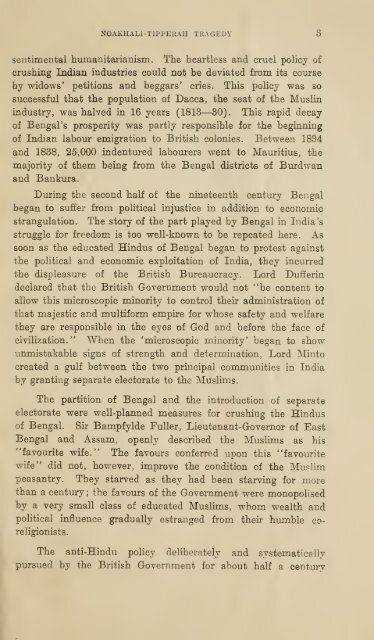You also want an ePaper? Increase the reach of your titles
YUMPU automatically turns print PDFs into web optimized ePapers that Google loves.
NOAKHALI-TIPPEKAH TRAGEDY 6<br />
sentimental liiimanitai'ianisni. The heartless and cruel policy of<br />
crushing Indian industries could not be deviated from its<br />
course<br />
by widows' petitions and beggars' cries. This pohcy was so<br />
successful that the population of<br />
Dacca, the seat of the Muslin<br />
industry, was halved in 16 years (1813—30), This rapid decay<br />
of Bengal's prosperity was partly responsible for the beginning<br />
of Indian labour emigration to British colonies. Between 1834<br />
and 1838, 25,000 indentinred labourers went to Mauritius, the<br />
majority of them being from the Bengal districts of Bm-dwan<br />
and Bankura.<br />
During the second half of the nineteenth centuiy Bengal<br />
began to suffer from political injustice in addition to economic<br />
strangulation. The story of the part played by Bengal in India's<br />
struggle for freedom is too well-known to be repeated here. As<br />
soon as the educated <strong>Hindu</strong>s of Bengal began to protest against<br />
the political and economic exploitation of India, they incurred<br />
the displeasure of the British Bureaucracy. Lord Dufferin<br />
declared that the British Government would not "be content to<br />
allow this microscopic minority to control their administration of<br />
that majestic and multiform empire for whose safety and welfare<br />
they are responsible in the eyes of God and before the face of<br />
civihzation. " When the 'microscopic minority' began to show<br />
unmistakable signs of strength and determination, Lord Minto<br />
created a gulf between the two prmcipal communities in India<br />
by granting separate electorate to the Milshms.<br />
The partition of Bengal and the introduction of separate<br />
electorate were well-planned measures for crushing the <strong>Hindu</strong>s<br />
of Bengal. Sir Bampfylde Fuller, Lieutenant-Governor of East<br />
Bengal and Assam, openly described the Muslims as his<br />
"favourite wife." The favours conferred upon this "favourite<br />
wife" did not, however, improve the condition of the Muslim<br />
peasantry. They starved as they had been starving for more<br />
than a centui-y ; the favours of the Government were monopolised<br />
by a very small class of educated Muslims, whom wealth and<br />
political influence gradually estranged from their humble coreligionists.<br />
The anti-<strong>Hindu</strong> policy deliberately and systematically<br />
pursued by the British Government for about half a centurv


